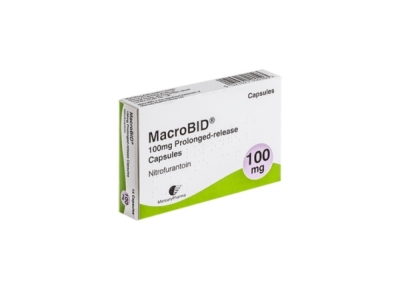Nitrofurantoin MR Capsules

* Images for illustrative purposes only
* Brand supplied may vary depending on stock availability
Same-day Service Available
Same-day service available for additional £10, conditions apply.

* Images for illustrative purposes only
* Brand supplied may vary depending on stock availability
Same-day service available for additional £10, conditions apply.
No appointment or long waiting times
Your information always remains private
All our doctors & pharmacists are qualified & based in the UK
Dispensed by our UK partner pharmacies


Choose from our treatment options or speak to the in-store pharmacist for advice

Complete our free online medical consultation to be reviewed by our Clinical Team

We will notify you when your medication is ready for collection
Nitrofurantoin is the first-choice treatment for uncomplicated urinary tract infection (UTIs) like cystitis. Cystitis is usually caused by a bacterial infection irritating the bladder. Nitrofurantoin is an antibiotic that works by killing the bacteria within the urinary tract or bladder that cause the infection. It kills the bacteria by entering their cells and damaging their genetic material (DNA). This leaves the bacteria unable to repair themselves or to multiply and so clears up the infection.
Unlike many other antibiotics, a sufficient amount of Nitrofurantoin is passed with your urine from the blood. This means the Nitrofurantoin is concentrated at the site of infection allowing it to target the bacteria causing the infection. This is why it is highly effective in treating UTIs, as it works at the point of infection. The symptoms should improve within two days of starting treatment.While most people see positive results from Nitrofurantoin, it is not 100% effective. Factors such as antibiotic resistance may mean that a course of Nitrofurantoin may not clear up your UTI. If Nitrofurantoin does not work for your UTI, you should speak to a doctor, who can recommend different treatments.
Nitrofurantoin dose is one 100mg capsule twice a day for three days. Doses should be spaced 10 to 12 hours apart. The capsules need to be swallowed whole with a drink of water. Generally, it's better to take Nitrofurantoin with a meal or snack. This helps prevent a stomach upset.
You can drink alcohol while taking Nitrofurantoin. Although, if you have a UTI, it is best to not drink alcohol. Instead, you should drink plenty of water to flush out the bacteria caused by the UTI.
Nitrofurantoin usually improves UTI symptoms in as little as 24 hours although the full effect can take up to 3 days. If you feel your symptoms are not improving or getting worse, then you should speak to a doctor for continued treatment or alternative antibiotics, as it may mean the infection is more severe.
Make sure you finish your entire course of treatment, even if you do not have any symptoms. If you stop taking your treatment early then the bacteria may continue to grow, which means the infection will come back quickly. Stopping your antibiotic course early can lead to resistance to the antibiotic in the bacteria, known as antibiotic resistance.
Always use this medication exactly as your clinician has told you. Check with our clinical team or your GP or pharmacist if you are not sure.
Medicines and their possible side effects can affect individual people in different ways. The following are some of the side effects that are known to be associated with this medicine. Just because a side effect is stated here, it does not mean that all people using this medicine will experience that or any side effect.
The common side effects of nitrofurantoin include:
Uncommon side effects of Nitrofurantoin include:
For full information on side effects and correct use, see the patient information leaflet. If any side effects concern you, or you are experiencing any of the side effects mentioned in the patient information leaflet whilst taking this medication, please contact our clinical team or speak to your GP.
Rare side effects of Nitrofurantoin include:
Bacteria can move further up the urinary tract and into the kidneys causing flank, back or side pain, temperature and possible nausea and vomiting. If this happens seek medical attention immediately as it is a serious form of UTI known as an upper urinary tract infection which may affect the kidneys.
Nitrofurantoin for a UTI should not be taken if you have:
Inform our clinical team before taking Nitrofurantoin if you have the following conditions:
Nitrofurantoin is generally suitable in the early stages of pregnancy. However, it is not suitable for women in the last stages of pregnancy. At the later stage of pregnancy, it may affect the baby.
If you are breastfeeding your baby, you should consult your GP before you take Nitrofurantoin. While only small amounts pass through to the breast milk, it is not right for all babies. It can affect the blood cells of babies with a certain condition.
Get emergency medical help if you have signs of an allergic reaction to this medication. These include:
It is important that you let us know which prescription, over-the-counter medicines and recreational drugs you are currently taking. You must also tell us about any other medical conditions that you currently have (or had in the past). This will help us ensure the prescribed medication is safe and appropriate for you to take.
For full information on warnings, medication interactions and contraindications, refer to the Patient Information Leaflet. Please read all packaging and the Patient Information Leaflet before taking any new medicine and inform our clinical team or your GP of medicines you are taking or intend to take.





